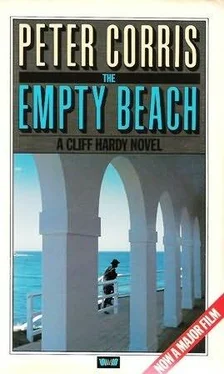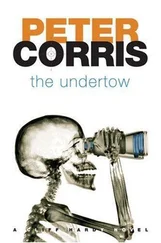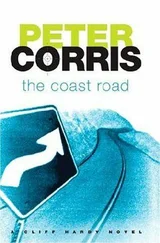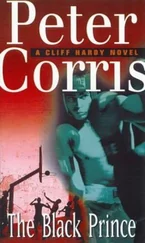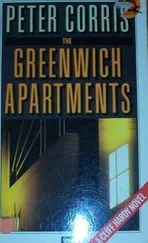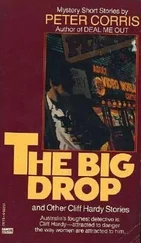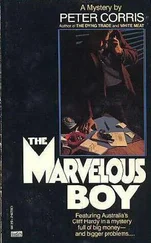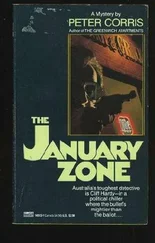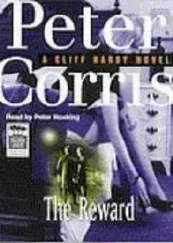Peter Corris - The Empty Beach
Здесь есть возможность читать онлайн «Peter Corris - The Empty Beach» весь текст электронной книги совершенно бесплатно (целиком полную версию без сокращений). В некоторых случаях можно слушать аудио, скачать через торрент в формате fb2 и присутствует краткое содержание. Жанр: Криминальный детектив, на английском языке. Описание произведения, (предисловие) а так же отзывы посетителей доступны на портале библиотеки ЛибКат.
- Название:The Empty Beach
- Автор:
- Жанр:
- Год:неизвестен
- ISBN:нет данных
- Рейтинг книги:3 / 5. Голосов: 1
-
Избранное:Добавить в избранное
- Отзывы:
-
Ваша оценка:
- 60
- 1
- 2
- 3
- 4
- 5
The Empty Beach: краткое содержание, описание и аннотация
Предлагаем к чтению аннотацию, описание, краткое содержание или предисловие (зависит от того, что написал сам автор книги «The Empty Beach»). Если вы не нашли необходимую информацию о книге — напишите в комментариях, мы постараемся отыскать её.
The Empty Beach — читать онлайн бесплатно полную книгу (весь текст) целиком
Ниже представлен текст книги, разбитый по страницам. Система сохранения места последней прочитанной страницы, позволяет с удобством читать онлайн бесплатно книгу «The Empty Beach», без необходимости каждый раз заново искать на чём Вы остановились. Поставьте закладку, и сможете в любой момент перейти на страницу, на которой закончили чтение.
Интервал:
Закладка:
‘Income tax,’ Hilde said. ‘I’m looking forward to paying some, lots.’
I grunted. Youthful idealism is hard to take. ‘How’s your love life?’ I was thinking of my big empty bed upstairs, the useless stirrings and the occasional dreams with unhappy endings.
‘Lousy.’ She stretched up for the ceiling; her small, hard breasts rose up under her shirt and I got a glimpse of her flat tennis player’s stomach. ‘There’s a lecturer I fancy. Lovely guy with a bitch of a wife. Nothing doing.’
‘Probably too old for you, anyway.’
‘Mm, thirty at least.’
Ancient, I thought, past it, ready for the monkey gland injections. I left her to the television and went upstairs, thinking about her and Marion Singer and Ann Winter. Tenant, client, and what?
My bedroom was dusty and there were more coffee cups in it than in the kitchen. I made a nest of them and swore to take them down in the morning. The pile of paperbacks had toppled over on the dresser and knocked the transistor radio onto the floor. I picked it up and heard it rattle ominously when I shook it. I put it down, deciding to let the full force of that disaster wait until the following day.
In the morning I tramped virtuously down with the coffee cups but Hilde hadn’t left the customary pot on the stove. I drank instant grumpily and leafed through the phone book until I found William A. Winter of Point Piper. After getting past a woman with strong public school vowels, I had Ann on the line.
‘God,’ she said. ‘I’m hung.’
‘Shocking. Any cops yet?’
‘No, they’ll be at the dump I expect. No-one much knows about the Travelodge here.’
‘Bruce mentioned this wino on the tape, Leon. You said you knew him too. D’you know where I can find him?’
‘He sleeps in a sort of chookhouse out in the back yard of a place in the street behind Bruce’s. I don’t know the number but you can’t miss it. It’s a three-storey terrace, free-standing, chunder-green.’
‘Okay, thanks.’
‘What’s the time?’ Her voice was blurry and she was having trouble hitting the hard consonants. Southern Comfort.
‘Nine-twenty. Why?’
‘At ten you’ll find Leon on the steps of the Haworth Arms.’ She spelled the word out.’
‘I’ve read the book,’ I said. ‘I’ll try there first. You okay?’
‘I will be when I’ve had a shower and some coffee and a hair of the dog. When will I see you next?’
‘What about Manny’s tonight, at six, say?’
‘Right.’
My parents had lived in Bronte some time before I was born. My sister remembers it; she says that that when they quarrelled he threatened to drown her at the beach. She’d just laugh at him and go off to the pub. It wasn’t so different from what I remembered happening when we lived at Maroubra. I can remember my father walking with me along that big, empty Maroubra beach while my mother was in the pub.
I had more leisure for these pleasant thoughts on this drive to Bronte. It was a bright, mild day and the council workers carving up a section of Oxford Street were whistling. I drove through the cutting and past Bronte beach which is scaled right down from Bondi-the sand, the grass, the changing sheds, the lot-and up towards the Waverley cemetery where the dead are laid out in rows on a headland, eternally oriented towards New Zealand.
A jogger strained up the grade and took a rest leaning on one of the sandstone horse troughs outside the cemetery. It was a long time since a horse had taken a breather there. I drove down beside the cemetery to take a look at the water before I plunged into pubs and rundown, chunder-green boarding houses. The dark blue sea, white-flecked and streaked with deep greens and silvery patches, rolled away forever to the east. The waves were high and even, occasionally rolling over and dumping with deep, resonant crashes. The board riders still defied them, but the waves could wait.
I located the Haworth Arms in my Guide to Sydney Pubs and headed for it. The warm day wouldn’t matter one way or the other to the step-sitters; their skins would be permanently tanned from years of walking the streets and sleeping rough. Leon, with a chookhouse to doss in, would be an aristocrat amongst them.
There were five of them on the steps, warriors of the bottle, who looked old but who probably weren’t. I addressed myself to the most awake-looking, a character with grey hair to his shoulders and a face as seamed as W. H. Auden’s.
‘I’m looking for Leon,’ I said.
‘Ain’t here. Got the price of a schooner, mate?’
I gave him a dollar and he put it carefully into the inside breast pocket of the ancient suit coat he wore.
‘I heard he was always here.’
‘S’right, but he ain’t. First time in I dunno how long.’ He turned to a small fat man who was rolling a cigarette out of what looked like cannibalised butts. ‘Seen Leon, Clyde?’ Clyde shook his head. I wondered if he thought that was worth a dollar, but he evidently didn’t because he didn’t look up. I carry a few cigarettes with me to prove that I’ve beaten the habit fair and square. I passed two across to Clyde, who put them cautiously into his makings tin.
‘Ta. Leon’s sick, probably, or dead.’
I jumped. ‘Why d’you say that?’
‘Stands to reason. He ain’t here, usually means a man’s sick or dead. Right, Stan?’
The man with the ploughed paddock face nodded. ‘Right.’
I drove back to Henneberry’s place and parked across the street. The sun hit the rounded white section of the flats, giving the building an exotic, Moorish look. I wondered how long it would take the landlord to re-let and decided it would depend on the carpet; he’d be slowed up if he had to replace it.
Life got a bit tougher in the streets further back. The houses were small and cramped; there was no view from here but some of the buildings actually grovelled down below street level as if emphasising the fact. The chunder-green joint stood out like an elephant among mice. It started about a foot back from the street and there was just enough room between the building and the fences on either side for a skinny cat to slip by.
I knocked on the front door gingerly. The disgusting green colour was everywhere and it had a slimy look as if it would come off on your hand. An enormously fat woman wearing a print dress and a crazily buttoned cardigan came to the door. She filled the doorway and when she spoke her three chins turned into four or five.
‘I’d like to see Leon, please.’
She looked at me and two tears as big as grapes squeezed out of her eyes and began to traverse the fat.
‘You can’t,’ she said. ‘He bloody died last night.’
9
Her name was Rose Jenkins. She was a talker, and she invited me back to her kitchen, where she made tea I didn’t drink. She gave it to me in great detail: she managed the boarding house in which there were fourteen roomers. Leon she let sleep in a lean-to out back for a nominal rent. Sometimes he’d come into the house to use the toilet; for the less serious calls of nature, he’d use the backyard. I was beginning to get a rounded-out picture of Leon.
I persuaded her to stop drinking tea and talking and show me the relevant scenes. The lean-to smelled bad. You could have called it airy and in winter it would be only marginally better than being out under a tree. There was a tattered mattress on the concrete floor with a heavy tweed coat, fashionable between the wars, thrown over it. The pillow was a pile of newspapers. The toilet was off a first-floor landing. Leon had come down from that level the short way, and his neck had been broken.
‘Did anyone see the fall?’ I asked.
Mrs Jenkins shook her head and the fat bounced and jiggled. ‘No, none of them what lives in the back part of the house was home when it happened. Mr Brass come home at about eight and he found the poor soul there. He was all hunched up against the wall and terrible broken up, they said.’
Читать дальшеИнтервал:
Закладка:
Похожие книги на «The Empty Beach»
Представляем Вашему вниманию похожие книги на «The Empty Beach» списком для выбора. Мы отобрали схожую по названию и смыслу литературу в надежде предоставить читателям больше вариантов отыскать новые, интересные, ещё непрочитанные произведения.
Обсуждение, отзывы о книге «The Empty Beach» и просто собственные мнения читателей. Оставьте ваши комментарии, напишите, что Вы думаете о произведении, его смысле или главных героях. Укажите что конкретно понравилось, а что нет, и почему Вы так считаете.
